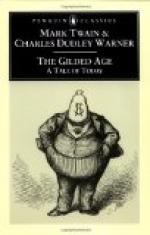Philip was not a philosopher, to be sure, but he had the old fashioned notion, that whatever a woman’s theories of life might be, she would come round to matrimony, only give her time. He could indeed recall to mind one woman—and he never knew a nobler—whose whole soul was devoted and who believed that her life was consecrated to a certain benevolent project in singleness of life, who yielded to the touch of matrimony, as an icicle yields to a sunbeam.
Neither at home nor elsewhere did Ruth utter any complaint, or admit any weariness or doubt of her ability to pursue the path she had marked out for herself. But her mother saw clearly enough her struggle with infirmity, and was not deceived by either her gaiety or by the cheerful composure which she carried into all the ordinary duties that fell to her. She saw plainly enough that Ruth needed an entire change of scene and of occupation, and perhaps she believed that such a change, with the knowledge of the world it would bring, would divert Ruth from a course for which she felt she was physically entirely unfitted.
It therefore suited the wishes of all concerned, when autumn came, that Ruth should go away to school. She selected a large New England Seminary, of which she had often heard Philip speak, which was attended by both sexes and offered almost collegiate advantages of education. Thither she went in September, and began for the second time in the year a life new to her.
The Seminary was the chief feature of Fallkill, a village of two to three thousand inhabitants. It was a prosperous school, with three hundred students, a large corps of teachers, men and women, and with a venerable rusty row of academic buildings on the shaded square of the town. The students lodged and boarded in private families in the place, and so it came about that while the school did a great deal to support the town, the town gave the students society and the sweet influences of home life. It is at least respectful to say that the influences of home life are sweet.
Ruth’s home, by the intervention of Philip, was in a family—one of the rare exceptions in life or in fiction—that had never known better days. The Montagues, it is perhaps well to say, had intended to come over in the Mayflower, but were detained at Delft Haven by the illness of a child. They came over to Massachusetts Bay in another vessel, and thus escaped the onus of that brevet nobility under which the successors of the Mayflower Pilgrims have descended. Having no factitious weight of dignity to carry, the Montagues steadily improved their condition from the day they landed, and they were never more vigorous or prosperous than at the date of this narrative. With character compacted by the rigid Puritan discipline of more than two centuries, they had retained its strength and purity and thrown off its narrowness, and were now blossoming under the generous modern influences. Squire Oliver Montague, a lawyer who had retired




